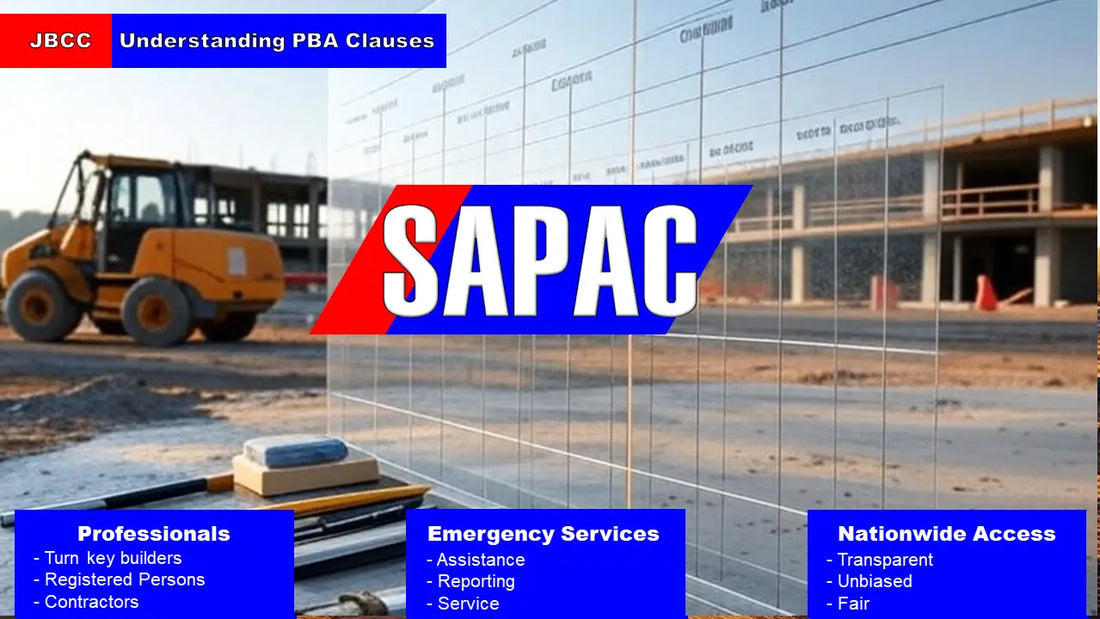
Understanding PBA Clauses: Key Considerations for South African Construction Stakeholders
SAPAC ReporterDeel
Understanding PBA "Principal building agreement" Clauses: Key Considerations for South African Construction Stakeholders
The Principal Building Agreement (PBA) is the cornerstone contract in South Africa’s construction sector, defining the roles and responsibilities of employers, contractors, and principal agents. A thorough understanding of its clauses, particularly those related to claims for time extensions or additional costs, is essential for effective project management. And must be followed through.
Clause 23: Framework for Claims
Clause 23 of the "PBA" - Principal building agreement, establishes the process for contractors to request time extensions or additional payments, emphasizing timely communication to manage project delays and costs effectively. The clause’s sub-clauses outline specific procedures and consequences, but their interpretation depends on the broader intent of the "PBA" - Principal building agreement.
Notification and Submission Requirements
Under sub-clause 23.4.2, contractors must notify the principal agent of any delay within 20 working days of becoming aware of it. Non-compliance may lead to the forfeiture of the claim, reflecting the clause’s strict enforcement. In contrast, sub-clause 23.5 requires contractors to submit a detailed claim within 40 working days from when the delay’s impact can be quantified. This sub-clause allows the principal agent to extend the deadline and lacks forfeiture provisions, indicating a more lenient approach.
Once a claim is submitted, sub-clause 23.7 mandates that the principal agent respond within 20 working days, either approving, adjusting, or rejecting the claim with clear reasoning. If no response is provided, sub-clause 23.8 deems the claim rejected, enabling contractors to pursue dispute resolution under clause 30.
This structured process promotes transparency and proactive project oversight.
Implications of Non-Compliance
The consequences of failing to meet deadlines under clause 23 vary by sub-clause. Sub-clause 23.4.2 strict time bar results in claim forfeiture if the 20-day notification period is missed. However, sub-clause 23.5 lack of forfeiture language and its provision for deadline extensions suggest flexibility, a shift from earlier PBA versions that imposed stricter penalties.
This flexibility aligns with the clause’s purpose: to encourage timely claim submissions without unduly punishing contractors. The 40-day period in sub-clause 23.5 begins only when the delay’s impact is quantifiable, allowing contractors a practical timeframe to compile their claims.
Practical and Legal Considerations
The 40-day submission window in sub-clause 23.5 supports project momentum by enabling timely claim assessments, which aids cash flow and decision-making. If a contractor submits a claim late, the principal agent may reject it if the delay hinders their ability to evaluate it within the 20-day response period. This could escalate to dispute resolution under clause 30, increasing costs and delays.
Employers may argue that sub-clause 23.5 functions as a time bar, but its wording and intent suggest otherwise. The clause prioritizes facilitating the principal agent’s assessment over penalizing contractors.
Legal Perspectives
South African and international case law provide guidance on interpreting time bar clauses. In Barkhuizen v Napier, the South African Constitutional Court ruled that such clauses must be reasonable and fairly enforced, using a two-step test: assessing the clause’s inherent reasonableness and its enforceability based on the circumstances of non-compliance. Similarly, in Arab Lawyers Network Company Ltd v Thomason Reuters, the English Commercial Court stressed that time bar clauses must be clear and unambiguous, with any uncertainty resolved in favor of the claiming party.
Legal analysis has indicated that only clauses with explicit forfeiture language, like sub-clause 23.4.2, qualify as true time bars. Sub-clause 23.5 lack of such language underscores its non-punitive intent, focusing on efficient claim resolution rather than barring late submissions.
Accountability and Practicality
For contractors and employers in South Africa’s construction industry, a clear understanding of PBA clause 23 is critical. The interplay between strict and flexible sub-clauses reflects a balance between accountability and practicality. By adhering to notification and submission deadlines, stakeholders can mitigate risks, avoid disputes, and ensure smoother project execution.
Further reading: Do not change the JBCC Contract